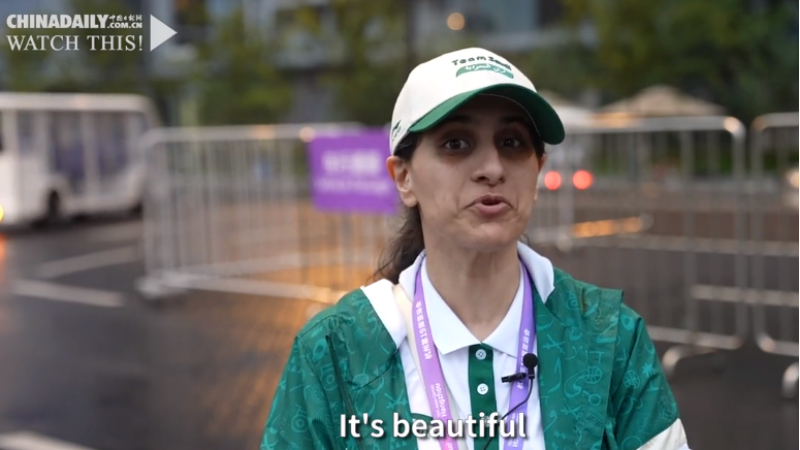An idyll example of rural vitalization

The changing landscape of Zhejiang's countryside areas has not only attracted locals back to their hometowns after years away working in big cities, but is also luring visitors and entrepreneurs from overseas. With boutique homestays, travel routes and e-commerce blossoming, more people are being attracted to, or are rediscovering, the charm of rural life. ZHANG WEI/CHINA DAILY/BAO KANGXUAN/ZHANG YONGTAO/FOR CHINA DAILY/WANG GANG/CHINA NEWS SERVICE
Long hours
In 2010, Chen decided to move back to Xiaye to open his own guesthouse after spending most of the previous 15 years in Shanghai — leaving his parents and children behind in the village.
"We used to run a food stall in Shanghai, but we never earned more than 100,000 yuan a year, despite working long hours," Chen said.
He and his family make about 300,000 yuan a year running the homestay in Xiaye.
"I can now take care of my children, parents, and even my fields, at almost the same time, and live a much more comfortable life," he said.
The program has also helped reshape areas of Longyou county, Quzhou city, Zhejiang.
Xikou township, which once faced problems similar to those in Xiaye, was commonly referred to as "dirty, messy and poorly managed". Unlike Xiaye, which relied primarily on agriculture, Xikou once boasted one of the best-known pyrite ore mines in China.
In the early-to-mid 2010s, as the deposits dried up and local authorities strengthened industrial restructuring efforts to achieve more sustainable economic development, a large number of mine workers and their families moved out.
Miao Chenhui, an official from Xikou, said, "For a while, this place, which was once teeming with people, was deserted."
However, Miao said refurbishment work quickly transformed the township into a "rural future community", with investment of more than 200 million yuan, and with the original features of the old buildings largely retained.
The old square was equipped with benches, on which residents rest and chat. The cinema was turned into a cultural hall, the dormitories became guesthouses, and the old factories now serve as shared offices for entrepreneurs such as Jiang Peng.
A native of Longyou, Jiang, 35, decided to settle in Xikou in 2018, after quitting his job as an art director in Hangzhou, capital of Zhejiang. In Xikou, he launched a company making and selling agricultural products, especially those made from bamboo. Longyou is home to more than 26,666 hectares of bamboo forests.
"I had long thought of promoting the specialties of my hometown to a wider audience and helping with rural vitalization," said Jiang, whose workshop is situated in Xikou's Old Street, another area transformed through the Green Rural Revival Program, and which attracts crowds of visitors, particularly during holidays.
Overseas sales
Last year, Jiang's company reaped a revenue of more than 15 million yuan, selling products not only in China, but overseas, including the United States, Europe and Southeast Asia. More importantly, though, he has provided more opportunities for local residents.
Xu Mingguang, a 70-year-old retired master craftsman of bamboo products, started to learn the trade when he was 13. But when he was in his 40s, the industry declined significantly, with plastic items largely replacing those made from bamboo.
As rising numbers of tourists visit Xikou, and as e-commerce booms in rural areas, more people are being attracted to, or are rediscovering, the charm of bamboo products.
Xu, who earns at least 3,000 yuan a month, added: "I am now doing my favorite work again. I'm also teaching a number of young apprentices. It's important that my weaving skills are passed down to the next generation."
The changing landscape of Zhejiang's rural areas has not only attracted those such as Chen and Jiang back to their hometowns, it is also luring overseas visitors.
In April 2021, Jeong Hyo-jun, a student from the Republic of Korea then studying at Tsinghua University, and his classmates arrived in Lizu village, Yiwu city, on a field trip to study China's culturally empowered rural vitalization.
"It was our first time in the area, and we were immediately impressed by its natural and entrepreneurial environment," Jeong said.
Lizu has followed a similar trajectory to Xiaye and Xikou in the two decades since the Green Rural Revival Program was introduced.
Fang Haolong, Party secretary of Lizu, said, "It may sound ridiculous, but even our own residents used to dislike the village."
But, by 2017, after the village was cleaned up and its infrastructure and facilities upgraded, Lizu had become part of a "boutique travel route" developed by the authorities in Yiwu to connect more than 100"beautiful villages" across the city.
As the village sought to distinguish itself through more cultural creation during Jeong's trip, he and his classmates agreed that the village was an ideal testing ground for their project.
In July 2021, Jeong's team, comprising 15 students from different countries, rented an old house in Lizu. They turned it into a "cultural space", in which customers drink coffee and buy traditional clothing and a range of cultural and creative products. Art exhibitions and even table games are staged in the space.
By creating such a space in the village, Jeong said they hope to attract young people to come from the cities to immerse themselves in the rural atmosphere and experience a different way of life. "We are also trying to attract young people living in the village and nearby areas. Ultimately, they will be the inner force for rural development," he said.
"So far, our project has been successful, and it still has a lot of potential," Jeong said.
"In my travels to the countryside in Zhejiang and nationwide, I've discovered the unique charm of different villages, and their beauty and vitality await to be discovered by more people," he said.
-
Xi's Thought on Culture put forward
October 9, 2023
-
Li highlights need to boost digital economy
October 10, 2023
-
Xi declares Hangzhou Asian Games open
September 23, 2023
-
Thumbs-up from Saudi Arabia
September 23, 2023



